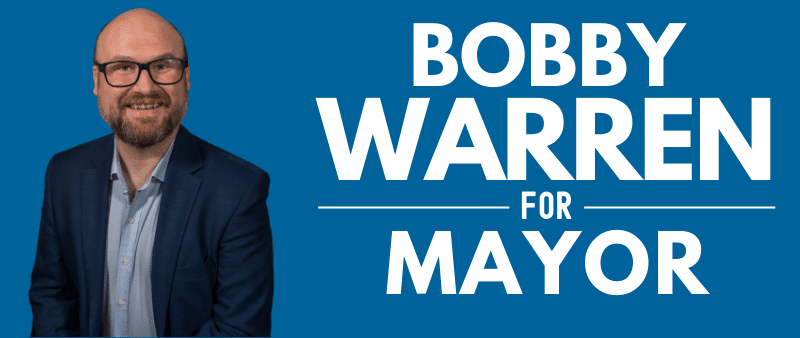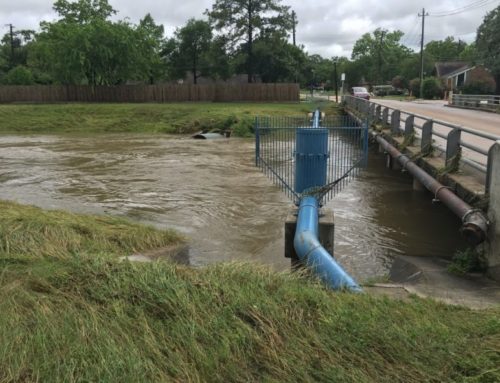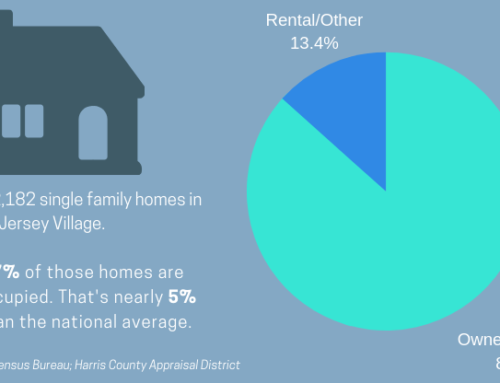Recently I have heard from a small but vocal group of citizens that are concerned about how the city spends time, money and effort on initiatives other than flooding. On the surface, the logic of the argument is difficult to counter. Given the importance of resolving the problem with flooding in Jersey Village, how can the city justify doing anything other than focusing all of its time, money and effort on the flooding problem?
Such an approach, however, makes a few critical mistakes. It’s essentially the equivalent of playing checkers while the rest of the world carries on playing chess.
What Is Jersey Village Doing About Flooding?
Some might feel that because they haven’t seen shovels in dirt that the city hasn’t done anything about flooding. The problem is that simply digging into dirt or tearing streets up without knowing what impact those actions will have would be a serious misappropriation of time and money. We must have a plan in place that is developed using reliable data, analysis and research.
The city has spent the past nine months working with Dannenbaum Engineering to develop a long-term flood mitigation plan which includes a comprehensive understanding of the current stormwater drainage system including streets, drains, pipes and the various stormwater channels around the city, such as White Oak Bayou. The study will help the city identify projects which would have the greatest impact on flood mitigation, the cost of those projects, and sources of outside funding for those projects.
How Does the City Pay for Flood Mitigation?
The city has already applied for some very promising sources of grant funding which should provide a significant amount of the money needed to mitigate some of the risk of flooding in Jersey Village. But where will the rest of the money come from?
Part of the money will likely come from general revenues, which is what many people think of when they think of funding for flooding or any number of other investments the city makes into infrastructure or amenities. Another source of funding comes from the issuance of bonds. For the sort of expenditures that will likely be needed to make a serious dent in the flooding problem, bonds are simply necessary to fund those projects.
How do we ensure that we have the revenues necessary in order to afford to issue bonds or spend money out of our general revenues? We must ensure that we do everything possible to increase our tax base. The last thing the city wants to do is put any additional financial burden on the citizens of Jersey Village. But how do we increase our tax base?
Development is an Essential Element of a Good Flood Control Strategy
We must do a better job of marketing Jersey Village to prospective home buyers and prospective businesses in order to ensure we have a growing tax base with which to combat the risk of flooding.
How do we accomplish that goal? By developing amenities such as a dog park, a splash pad, a better walking trail system, and improved parks overall. These are the sorts of amenities which attract young families to Jersey Village. Why are young families important? Because that is the demographic that draws in better, more valuable business such as retail, restaurants, family-friendly entertainment and grocery stores. Those businesses, in turn, generate higher sales tax and property tax revenue. That is particularly true if those businesses move into undeveloped parts of Jersey Village.
In order to attract businesses, the city is in the process of planning for the creation of a Tax Increment Reinvestment Zone (TIRZ) to attract development in areas of the city that have historically been undeveloped or underdeveloped. Tools such as a TIRZ have been used successfully by numerous communities throughout Texas and the United States in order to jump-start economic development.
By investing some revenues now into strategies to attract new residents and stimulate economic development, we make an investment in our future that will continue to reap financial benefits that will allow us to improve as a community and make further investments in flood control.
Jersey Village cannot afford to take a simplistic approach to this problem. We don’t have to choose flood mitigation over development. A smart strategy for both flood mitigation and economic development recognizes that the two are intertwined. We need flood mitigation in order to ensure that economic development is sustainable. We also need economic development to ensure that flood mitigation is economically feasible.





